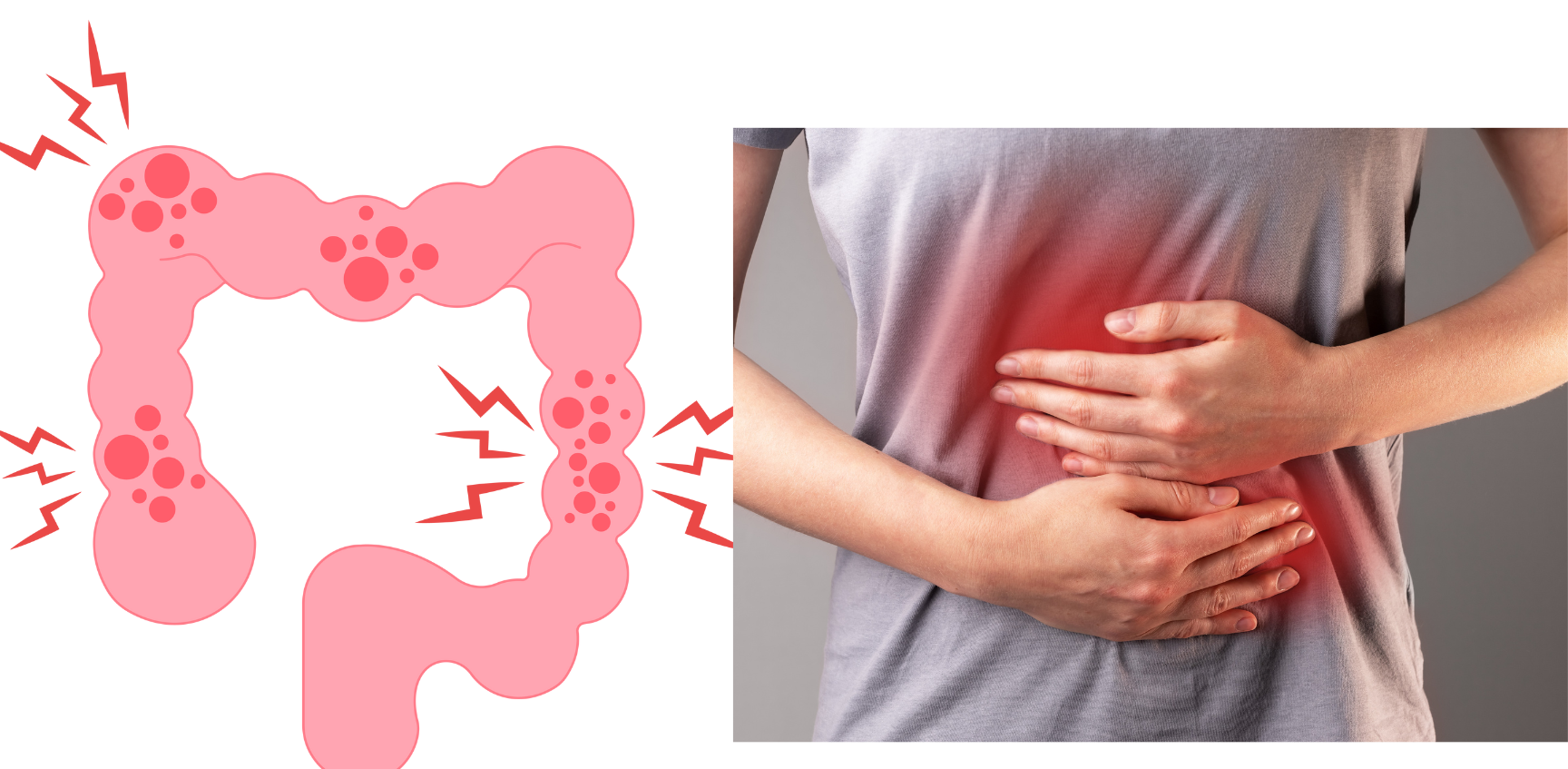Crohn's Disease

What is Crohn's Disease?
Crohn's disease is a chronic inflammatory condition that affects the gastrointestinal tract, most commonly the small intestine and colon.
Who’s at risk for Crohn's Disease?
Crohn's disease can affect anyone, but it is more common in individuals with a family history of the condition or a history of inflammatory bowel disease. Other risk factors may include smoking and certain environmental factors.
What causes Crohn's Disease?
The exact cause of Crohn's disease is not yet fully understood, but it is believed to be a combination of genetic and environmental factors that trigger an abnormal immune response in the gastrointestinal tract.
How does Crohn's Disease start?
Crohn's disease may develop slowly over time, and symptoms may become more severe if left untreated. The condition can lead to a range of symptoms, including abdominal pain, diarrhea, and weight loss.
What are the symptoms of Crohn's Disease?
The symptoms of Crohn's disease can vary widely from person to person, but common symptoms may include:
- Abdominal pain and cramping
- Diarrhea
- Rectal bleeding
- Fatigue
- Loss of appetite
- Weight loss
- Fever
How is Crohn's Disease diagnosed?
Crohn's disease is typically diagnosed through a combination of medical history, physical examination, and diagnostic tests, such as endoscopy or imaging tests. A biopsy may also be performed to confirm the presence of inflammatory cells in the gastrointestinal tract.
How can Crohn's Disease be treated?
Treatment for Crohn's disease may involve a combination of medication, lifestyle changes, and, in some cases, surgery. Medications, such as anti-inflammatory drugs and immunosuppressants, may be used to manage symptoms and prevent flare-ups. Lifestyle changes, such as avoiding certain foods and managing stress, can also help manage symptoms and improve overall health.
What complications may occur with Crohn's Disease?
Some of the potential complications include:
Intestinal blockages: The inflammation and thickening of the intestinal wall may obstruct the passage of food or stool, leading to a blockage that may require medication, dilation, or surgery to resolve.
Ulcers: Inflammation caused by Crohn's disease can lead to the development of painful ulcers in the digestive tract, including the mouth, esophagus, stomach, small intestine, and colon.
Malnutrition: The impaired absorption of nutrients due to inflammation and damage in the digestive tract can lead to malnutrition, vitamin deficiencies, and anemia.
Fistulas: In severe cases, inflammation can create abnormal tunnels (fistulas) between different parts of the intestine or between the intestine and other organs, such as the bladder, vagina, or skin, which may require surgical intervention.
Anal fissures: Small tears in the tissue of the anus can occur as a result of inflammation and swelling in the area, causing pain and bleeding, particularly during bowel movements.
Perianal disease: Crohn's disease can lead to complications in the perianal area, including abscesses, skin tags, and fissures, which may require treatment to alleviate discomfort and prevent further complications.
Osteoporosis: The long-term use of corticosteroids and malabsorption of nutrients, such as calcium and vitamin D, can increase the risk of osteoporosis, a condition in which bones become weak and prone to fractures.
Psychological impacts: Living with a chronic condition like Crohn's disease can have a significant impact on a person's mental health, leading to social isolation, anxiety, depression, and reduced quality of life.
Early diagnosis, appropriate treatment, and ongoing medical care can help manage Crohn's disease and reduce the risk of these complications. It is essential for individuals with Crohn's disease to work closely with their healthcare team to develop a personalized treatment plan and monitor their condition regularly.
How can I prevent Crohn's Disease?
Preventing Crohn's disease is not currently possible, but managing risk factors, such as smoking and maintaining a healthy lifestyle, may help reduce the likelihood of developing the condition.
Long-term management of Crohn's Disease
Long-term management of Crohn's disease involves ongoing monitoring of symptoms and regular follow-up with healthcare professionals. It is important to work closely with healthcare professionals to develop an individualized treatment plan that addresses the specific needs of the person with Crohn's disease.
What is recent research saying about Crohn's Disease?
Recent research has focused on identifying potential new treatments for Crohn's disease, as well as exploring the role of the gut microbiome and genetics in the development of the condition. There is also ongoing research into the effectiveness of different types of therapy for managing symptoms and preventing complications.
Where can I go for more information on Crohn's Disease?
The Crohn's and Colitis Foundation and the National Institute of Diabetes and Digestive and Kidney Diseases provide up-to-date information on Crohn's disease, including diagnostic criteria, treatment options, and ongoing research.

